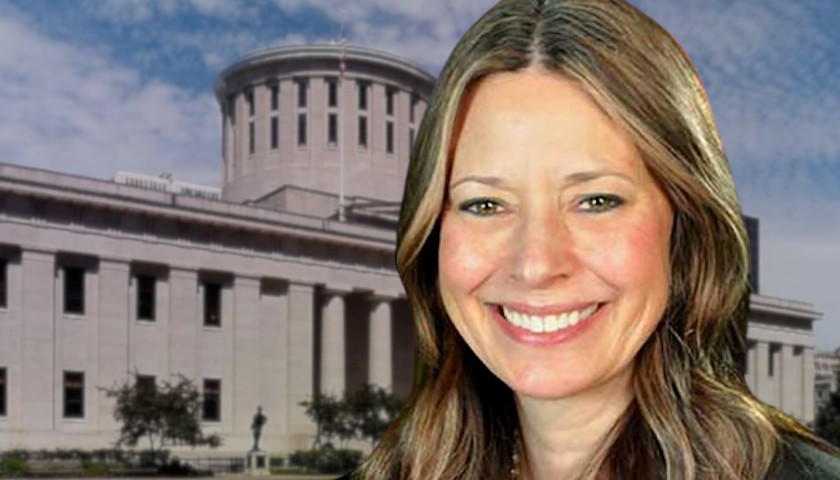COLUMBUS, Ohio – Senate Bill 22 passed the Ohio House by a vote of 57 to 37 Wednesday afternoon. Five Republicans did not cast a vote – Paul Zeltwanger (Mason), Tracy Richardson (Marysville), Mike Loychik (Bazetta), Jeff LaRe (Violet Twp.), and Ron Ferguson (Wintersville).
Three Republicans, Nino Vitale (Urbana), Ron Ferguson (Wintersville) and Anrea White (Kettering) voted against the bill. Vitale has been an outspoken opponent to the DeWine Administration’s pandemic health orders. Vitale was also one of a handful of lawmakers who supported articles of impeachment based on alleged executive overreach during the state’s handling of COVID.
The Senate concurred on the House changes, so now SB22 will be sent to Governor DeWine where he has the choice to approve, veto, or do nothing. In the event of the latter, the bill would become a law after 10 days.
If the Governor vetoes, the legislation would go back to where it originated, the Senate, where it could be taken up for a veto-override vote.
Senator Andrew Brenner (R-District 19) told The Ohio Star “[R]ight now we have 25 [votes for the bill]. I don’t see that changing.”
Speaker Bob Cupp (R-Lima) said he’s “absolutely positive” he has the votes to override.
Ohio State Representative Scott Wiggam (R-Wooster) told The Star the version of SB22 that passed the House on Wednesday contained provisions of House Bill 90 – the House version of SB22. Wiggam is Chairman of the House State and Local Government Committee, where both bills ended up for testimony and debate.
He said the major elements are:
- 90-day limit to declarations of health emergency unless General Assembly chooses to extend
- General Assembly can act to rescind emergency declarations after 30 days with a concurrent resolution
- Orders and agency rules can be rescinded immediately by concurrent resolution of the House and Senate
- Oversight of orders applies to all state agencies, not just the Ohio Department of Health
- Oversight of orders applies to not just the Governor, but every state employee empowered to issue an emergency rule or order
- Ohioans who contest an order, rule or mandate will have the court case heard in their home county, as opposed to a Franklin County court
- Ohioans who bring legal action against rules, orders and mandates will be reimbursed for legal fees if the citizen wins the case
- Health departments cannot issue public health emergency orders or rules against a broad group or class of people – SB22 defines quarantine and isolation and thus applies lockdown restrictions to people infected or in direct contact with a medically diagnosed person
- Health orders have no automatic expiration date – a 120-day expiration is already part of Ohio Revised Code
Wiggam said, “The executive branch of government still has complete authority to issue emergency declaration orders and rules without hindrance. The bill, however, allows the General Assembly to overturn orders and rules on day one with a concurrent resolution of both the House and Senate.”
A summary of the bill can be viewed below.
[wonderplugin_pdf src=”https://tennesseestar.com/wp-content/uploads/2021/03/sb22_analysis_15961.pdf” width=”650″ height=”866px” style=”border:0;”]
Maurice Thompson is an Ohio constitutional attorney who delivered an in-person testimony as a party interested in House Bill 90 before the House State and Local Government Committee.
Thompson talked with The Star late Wednesday. He said the bill has some “solid parts,” including:
- The ability of citizens to challenge pandemic rules and orders in their home counties will reduce the burden on citizens to travel to Columbus, prevent gamesmanship by corrupt government attorneys, and ensure a fair and neutral judicial forum instead of one solely elected by the voters of Franklin County.
- The ability to recover attorneys fees prevents Ohioans from having to pay for the State’s mistakes, when those mistakes are unlawful, and incentivizes more quality attorneys to scrutinize and challenge such regulations.
- The Bill significantly limits the unbelievably broad powers of county and city health departments that the General Assembly has vested in them over the years, such that only infected individuals whether than groups or industries can be regulated by local health departments.
However, Thompson said, “The requirement that pandemic rules and orders automatically expire after 30 days unless the General Assembly renews them was the centerpiece of any reform, and appeared in HB90.”
He continued, “While the General Assembly has the authority to rescind orders with a concurrent resolution, I very much doubt that power will ever be used, especially with one-party rule. It requires fast action, courage, and a Speaker of the House and President of the Senate who are both willing to bring the resolution to the floor for a vote.”
Thompson said this law “wouldn’t stop another move to prohibit nonessential business for 60 days.” Reversing that would require lawmakers to hustle to get orders rescinded. He also noted that the state of emergency declaration in effect over the last year affected only daycares and liquor permit establishments, while most controversial policies were made through orders that were not contingent of the declaration of a state of emergency.”
Representative Jena Powell (R-Arcanum), attempted to bring a bill amendment to the floor before the vote. The amendment “[t]erminates any order or rule issued or adopted by the Governor or the Department of Health in response to a state of emergency after 30 days, unless the General Assembly extends the order or rule by adopting a concurrent resolution.”
Powell worked with the Legislative Service Commission – a nonpartisan group comprised, in part, of lawyers and researchers that assists lawmakers – to draft the amendment. But when she tried to bring the measure to the floor for consideration prior to the vote, Speaker Bob Cupp ignored Powell’s request.
This is not the first time Cupp has ignored a lawmaker who attempted to bring an amendment to the floor – he did something similar to then-Representative Candice Keller (R-Middletown) in the 133rd General Assembly at the end of last year.
Powell sent the following statement to The Star about the incident:
Today, I filed and prepared to introduce AM0718 to Substitute Senate Bill 22. When I attempted to present my amendment on the floor, I was disregarded. All Democrats who wanted to present amendments were allowed to do so, but I was not. Leadership made it apparent that they do not care about the 120,000+ individuals that I represent. We filed a motion to reconsider so that members could speak, but the Speaker recessed session, allowing SB 22 to be concurred on in the Senate – ultimately leaving my district without a voice. The Speaker and leadership should be ashamed at the lack of respect for Ohioans they showed today.
One Statehouse insider told The Star that Powell’s amendment wasn’t something that took Cupp or the House by surprise. According to the source she introduced the idea earlier in the day during the Republican Caucus – a move that drew criticism from fellow GOP lawmakers.
Powell said, “This was a great amendment to restore more freedom to Ohioans, but unfortunately it became apparent that too many members did not want their district to see where they stand on the fight to stand against a tyrannical governor and give the legislative fully back to the people.” She concluded, “instead, we have a watered-down Senate Bill 22.”
Thompson concurred, saying ignoring the amendment stopped a vote for or against a 30-day limit, which protects Republicans who don’t support providing a time limit on executive branch and agency emergency powers. In essence, it protects them from having to publicly declare a position.
Powell’s full amendment can be viewed below.
[wonderplugin_pdf src=”https://tennesseestar.com/wp-content/uploads/2021/03/Powell-Amendment.pdf” width=”650″ height=”866px” style=”border:0;”]
The Star contacted Speaker Cupp’s office and asked why he disregarded Powell’s request, but did not receive a response by press time.
An Ohio journalist reported that Speaker Cupp, when asked if he thought it was fair to not allow an elected official to present a drafted amendment, replied, “The bill that was passed today was supported by the Republican caucus, it was agreed to by the Senate.”
"The bill that was passed today was supported by the Republican caucus, it was agreed to by the Senate."…said it twice
— Andy Chow (@andy_chow) March 10, 2021
The Statehouse insider told The Star that for days Republican members of the House were told by Representative Seitz (R-Green Twp), who is an attorney, that the resolutions are non-binding and that a law has to be made by a bill in the legislature and signed by the Governor.
Vitale provided reasoning for his “no” vote on SB22 in a released statement:
I swore an oath to uphold the Ohio Constitution. The Ohio Constitution does not allow for a resolution to override a law. The rank order is the Ohio Constitution is the highest law of the state, then Ohio Law. Resolutions are low level and non-binding. While I agree with the premise of the bill, I cannot vote for something that is both unconstitutional and frankly does nothing. The legislature has had 12 months to restrict the governor powers. It has collectively chosen not to. SB 22 does nothing we cannot already do. It should have had a 15 or 30-day clause termination.
The Star asked Thompson about the matter and he agreed with Vitale that SB22 was a disappointment, but parted ways with Vitale on the lawfulness of SB22.
“This would be the bill making the law defining the scope of administrative power,” he said; adding, “The legislature has not just the authority, but the duty, to limit that power. The General Assembly should have an expert in-house to provide counsel on these things, rather than attempting to informally flesh it out through fast-paced debates behind closed doors in Caucus.”
– – –
Jack Windsor is the Statehouse Reporter at The Ohio Star. Windsor is also an independent investigative reporter. Follow Jack on Twitter. Email tips to [email protected].





